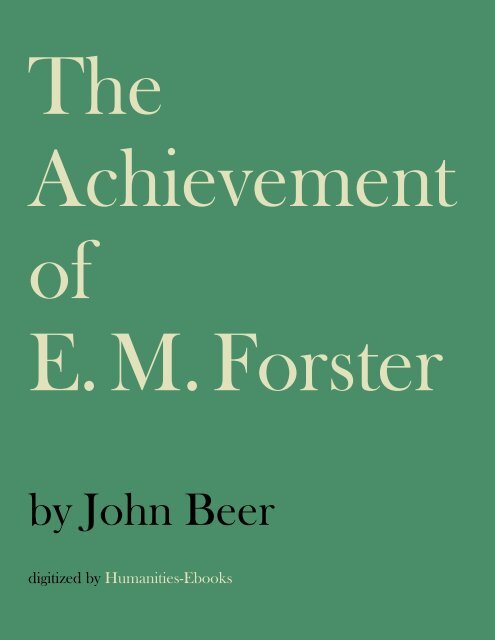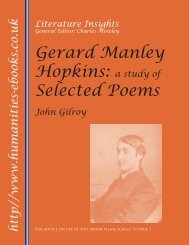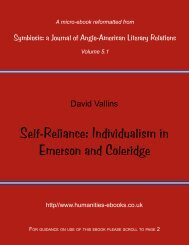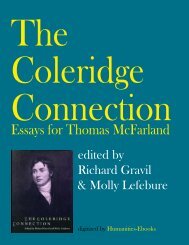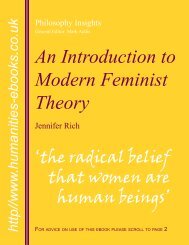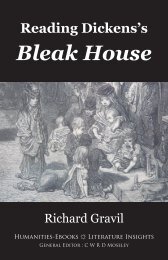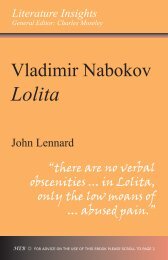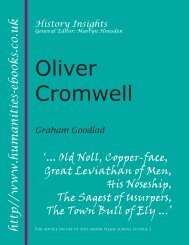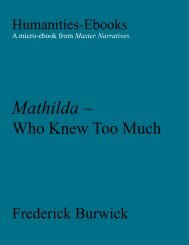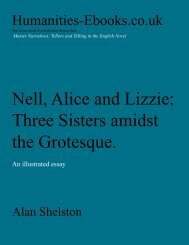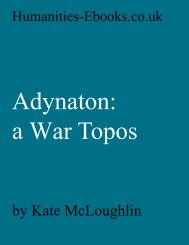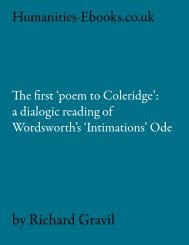The Achievement of E. M. Forster - Humanities-Ebooks
The Achievement of E. M. Forster - Humanities-Ebooks
The Achievement of E. M. Forster - Humanities-Ebooks
Create successful ePaper yourself
Turn your PDF publications into a flip-book with our unique Google optimized e-Paper software.
Running Head <br />
<strong>The</strong><br />
<strong>Achievement</strong><br />
<strong>of</strong><br />
E. M. <strong>Forster</strong><br />
by John Beer<br />
digitized by <strong>Humanities</strong>-<strong>Ebooks</strong>
Publication Data<br />
© John Beer, 1962, 2007<br />
<strong>The</strong> Author has asserted his right to be identified as the author <strong>of</strong> this Work<br />
in accordance with the Copyright, Designs and Patents Act 1988.<br />
First published in 1962 by Chatto & Windus<br />
This edition published in 2007 by <strong>Humanities</strong>-<strong>Ebooks</strong> LLP<br />
Tirril Hall, Tirril, Penrith CA10 2JE<br />
Reading Options<br />
* To use the navigation tools, the search facility, and other features <strong>of</strong> the<br />
toolbar, this Ebook should be read in default view. In Lizard Viewer please<br />
select 82%.<br />
* To navigate through the contents use the hyperlinked ‘Bookmarks’ at<br />
the left <strong>of</strong> the screen.<br />
* To search, expand the search column at the right <strong>of</strong> the screen or click<br />
on the binocular symbol in the toolbar.<br />
* For ease <strong>of</strong> reading, use to enlarge the page to full screen<br />
* Use to return to the full menu.<br />
* Hyperlinks appear in Blue Underlined Text.<br />
Licence<br />
By purchasing this book you have been granted the right to read this work<br />
on-screen. No part <strong>of</strong> this publication may be otherwise reproduced or transmitted<br />
or distributed without the prior written permission <strong>of</strong> both the copyright<br />
owner and the publisher. Making or distributing copies <strong>of</strong> this book constitutes<br />
copyright infringement and would be liable to prosecution. Thank you<br />
for respecting the rights <strong>of</strong> the author.<br />
It is permissible to print a copy <strong>of</strong> the book for your own use.<br />
ISBN 978-1-84760-003-5
<strong>The</strong> <strong>Achievement</strong> <strong>of</strong> E. M. <strong>Forster</strong><br />
John Beer<br />
Tirril: <strong>Humanities</strong>-<strong>Ebooks</strong>, 2007
Contents<br />
Chapter 1<br />
Aspects <strong>of</strong> a Novelist<br />
Chapter 2<br />
<strong>The</strong> Earth and the Stars<br />
Chapter 3<br />
From a View to a Death<br />
Chapter 4<br />
Flame Boats on a Stream<br />
Chapter 5<br />
In Country Sleep<br />
Chapter 6<br />
<strong>The</strong> Undying Worm<br />
Chapter 7<br />
Serving the World<br />
Chapter 8<br />
In and out <strong>of</strong> Time<br />
Bibliography and Abbreviations
Chapter 1<br />
Aspects <strong>of</strong> a Novelist<br />
THE account <strong>of</strong> E. M. <strong>Forster</strong> which has reached more readers than any other<br />
appears on the cover <strong>of</strong> a paper-back edition <strong>of</strong> his works:<br />
He is one <strong>of</strong> those rare authors whose books are kept and re-read, not only for their<br />
stories, but for the wise sayings which crowd their pages and the gentle humanist<br />
philosophy which they reveal.<br />
A general comment like this, addressed as it is to the reader who likes a good story,<br />
seasoned with occasional wisdom, might be allowed to stand. It is more disquieting<br />
to find the author <strong>of</strong> the Concise Cambridge History <strong>of</strong> English Literature, which<br />
ought to have a different audience in view, writing <strong>of</strong> the ‘shy, unworldly quality’ <strong>of</strong><br />
work ‘almost diffidently presented’ by a man who is ‘at heart a scholar’. As Lionel<br />
Trilling points out, the author <strong>of</strong> such a comment has taken an irony literally and has<br />
misinterpreted a manner. <br />
One reason for the diverging views <strong>of</strong> critics in dealing with <strong>Forster</strong>’s work is a<br />
basic uncertainty as to how the novels ought to be read. <strong>The</strong>re is a deceptive directness<br />
about them—a concentration on events, which encourages the reader to read them<br />
‘for the story’.<br />
<strong>Forster</strong> himself has never forgotten the truth which he reiterated painstakingly in<br />
his Clark Lectures: ‘Yes—oh dear yes—the novel tells a story.’ Yet it would be foolish<br />
to see in this statement more than a basis on which to build. For example, there is<br />
a good deal <strong>of</strong> attention to plot in the novels: but it is evidently not aimed at creating<br />
(In the case <strong>of</strong> <strong>Forster</strong>’s novels, the page reference is to the pocket edition but the text is normally<br />
taken from the first edition. A list <strong>of</strong> abbreviations appears in the Bibliography.)<br />
G. Sampson, <strong>The</strong> Concise Cambridge History <strong>of</strong> English Literature 1941, p.969<br />
L. Trilling, E. M. <strong>Forster</strong>, London, 1944, p. 9.<br />
AN, 40-1; 62.
Aspects <strong>of</strong> a Novelist <br />
the normal relationship between author and reader. An author whose main concern is<br />
to entertain his audience will sometimes surprise them—but he will also take care not<br />
to jar them. At the point <strong>of</strong> surprise, the reader will begin to recognize that preceding<br />
events contained the seeds <strong>of</strong> the surprise. <strong>Forster</strong>’s surprises, on the other hand, do<br />
sometimes jar—particularly those irruptions <strong>of</strong> death or violence which break suddenly<br />
into a prevailing atmosphere <strong>of</strong> domestic comedy. On examining the context<br />
<strong>of</strong> such passages, indeed, one sometimes discovers that <strong>Forster</strong> has been deliberately<br />
leading his readers in a different direction: that the irruption <strong>of</strong> violence has actually<br />
been preceded by a letting down <strong>of</strong> tension in the narrative. <strong>The</strong> result is that sudden<br />
death enters the novel with the jarring quality that it has in real life. <strong>The</strong> harmonic<br />
pattern within which we were comfortably established suddenly gives way. <strong>The</strong>re is<br />
a moment <strong>of</strong> unreality which we then recognize to be in point <strong>of</strong> fact a moment <strong>of</strong><br />
reality—but the reality <strong>of</strong> everyday life, not <strong>of</strong> art.<br />
Such intrusions <strong>of</strong> an unartistic ‘reality’ should in themselves convince the reader<br />
that this is no ordinary storyteller. If he is used to reading detective stories he may<br />
well draw the same conclusion still more strongly after reading A Passage to India. A<br />
novel which has the air <strong>of</strong> a good mystery story, with a succession <strong>of</strong> exciting events<br />
and promise <strong>of</strong> an unexpected dénouement, turns out to be nothing <strong>of</strong> the sort. Long<br />
before the novel ends, the woman around whom the plot revolves suddenly withdraws<br />
the charge that she has been assaulted by a young Indian doctor. <strong>The</strong> case is dropped,<br />
and apart from desultory discussion, we hear no more <strong>of</strong> the events that gave rise to it.<br />
<strong>The</strong>re is no final twist <strong>of</strong> events, no sudden revelation. Many readers must have laid<br />
down the novel with feelings <strong>of</strong> disappointment or even <strong>of</strong> disgust.<br />
Nor is it enough to read <strong>Forster</strong> for his social comedy alone. <strong>The</strong> late Rose Macaulay<br />
produced a critique <strong>of</strong> the novels which dwelt mainly upon these features. She had<br />
shared and knew well the background from which <strong>Forster</strong> came and described, with<br />
an assurance touched by nostalgia, his natural ancestors—’philanthropists, bishops,<br />
clergy, members <strong>of</strong> parliament, Miss Hannah More’. But her familiarity with the scene<br />
and her enjoyment <strong>of</strong> <strong>Forster</strong>’s skill in evoking it also blinkered her. It was the natural<br />
corollary <strong>of</strong> her views that she should conclude by preferring the earlier novels, ‘the<br />
three commentaries on then contemporary life that appeared from thirty to forty years<br />
ago—and have, with the years, taken on a delightful period flavour— <strong>The</strong> Longest<br />
Journey, A Room with a View and Howards End. . . .’ <br />
<strong>The</strong> reader who comes to <strong>Forster</strong> looking for social comedy, however, will also<br />
meet with disappointments. He will be put out by the fact that the novels are not only<br />
R. Macaulay, Writings <strong>of</strong> E. M. <strong>Forster</strong>, 1938, p. 9; <strong>The</strong> Listener, 12.12.46, p. 847.
Aspects <strong>of</strong> a Novelist <br />
serious in basic intention but sometimes deliberately flat in their immediate effect.<br />
<strong>The</strong> attractiveness is there, but it has a habit <strong>of</strong> disappearing round the corner at<br />
moments when one most expects it to be present.<br />
A more promising line is taken by those critics who look at <strong>Forster</strong>’s work against<br />
the moral traditions <strong>of</strong> the English novel. While acknowledging the high quality <strong>of</strong><br />
plot and characterization, they see that the author is not simply aiming to make his<br />
readers turn the pages. He is inviting them to pause and reflect from time to time: to<br />
see in the events as they are described patterns which constantly recur in our world<br />
and to judge them by moral principles which are sensitive to the full implications <strong>of</strong><br />
each particular situation.<br />
For many critics this is a very satisfactory art-form, combining a number <strong>of</strong> virtues.<br />
<strong>The</strong>re is a concentration on actions, presented in some sort <strong>of</strong> serial continuum,<br />
which gives an immediate reference to reality. <strong>The</strong> element <strong>of</strong> universality in the<br />
action makes for seriousness. And the fact that the reader is at one and the same time<br />
being entertained and reacting morally provides the work with a complexity <strong>of</strong> effect<br />
which challenges analysis.<br />
So far as <strong>Forster</strong>’s work is concerned, however, there are drawbacks to a strictly<br />
moral approach. For one thing, the social issues which are being discussed in moral<br />
terms are now somewhat dated. <strong>Forster</strong>’s examination <strong>of</strong> the British Raj in India may<br />
attract American critics by its relevance to their persisting anti-colonial tradition. For<br />
British readers, the novel loses some <strong>of</strong> its point in a world where India is independent.<br />
Similarly, the unexpected eclipse <strong>of</strong> the old middle class and its power, to be<br />
replaced by a more amiable but less principled attitude in society at large, makes one<br />
less inclined to laugh at the absurdities <strong>of</strong> Sawston. It is too much like hitting a man<br />
when he is down.<br />
Of course, this is not the whole story. So long as people have to live together in<br />
social relationships the sort <strong>of</strong> problems which come to a head in Sawston or British<br />
India will continue to exist. <strong>The</strong> moral element in the novels in fact burrows beneath<br />
particular issues towards ultimate human problems.<br />
<strong>The</strong> ‘moral’ approach at its best can be found in Lionel Trilling’s study. In his<br />
examination <strong>of</strong> <strong>Forster</strong>’s work, he has been concerned with two objects: to test the<br />
novels by the touchstone <strong>of</strong> human experience and to match them against the best<br />
that has been thought and written during the period. <strong>The</strong> result is a highly intelligent<br />
evaluation <strong>of</strong> the novels in terms <strong>of</strong> the liberal humanist tradition. His concluding<br />
judgment has the weight <strong>of</strong> the whole book behind it:
Aspects <strong>of</strong> a Novelist <br />
<strong>Forster</strong> reminds us <strong>of</strong> a world where the will is not everything, <strong>of</strong> a world <strong>of</strong> true<br />
order, <strong>of</strong> the necessary connection <strong>of</strong> passion and prose, and <strong>of</strong> the strange paradoxes<br />
<strong>of</strong> being human. He is one <strong>of</strong> those who raise the shield <strong>of</strong> Achilles, which<br />
is the moral intelligence <strong>of</strong> art, against the panic and emptiness which make their<br />
onset when the will is tired from its own excess. <br />
For many readers, this sums up certain positive effects <strong>of</strong> the novels with economy<br />
and deftness. It defines the ‘singleness’ <strong>of</strong> them.<br />
But if there is a singleness in the novels, there is also a complexity: and that<br />
complexity is not simply, shall we say, the result <strong>of</strong> interweaving prosaic and passionate<br />
elements. It is a complexity which reminds us that <strong>Forster</strong> is ultimately a<br />
romantic writer and that his work reflects some <strong>of</strong> the tensions and conflicts peculiar<br />
to romanticism.<br />
Nothing has yet taken the place <strong>of</strong> romanticism in the West. We are still romantics<br />
by birth, however much we may disguise our romanticism by devices such as cynicism<br />
or understatement. But since 1914 much <strong>of</strong> the original impetus <strong>of</strong> romanticism<br />
has been lost. It has lost its innocence in the face <strong>of</strong> Freud, its idealism in face <strong>of</strong> the<br />
events and policies <strong>of</strong> two world wars, and its positiveness in face <strong>of</strong> a world that<br />
becomes steadily more complex. It is not dead: most modern attitudes are romantic<br />
attitudes. But the fact that we describe them as ‘attitudes’ betrays the difference.<br />
<strong>The</strong> peculiar forces which drove romanticism between the French Revolution and<br />
the First World War, enabling it to inspire a whole way <strong>of</strong> life, have gone. <strong>The</strong>y will<br />
hardly combine again in a similar pattern.<br />
To understand <strong>Forster</strong> fully, one has to see him at the end <strong>of</strong> that earlier phase, the<br />
spiritual heir <strong>of</strong> Blake, Coleridge and Shelley, <strong>of</strong> Beethoven and Wagner. He shares<br />
their aspirations and their struggles, while counterpoising them with his grasp <strong>of</strong><br />
human affairs. <strong>The</strong> fact that both factors are present in his thinking inevitably affects<br />
his work. <strong>The</strong> straightforward run <strong>of</strong> the plot is not usually disrupted, but is sometimes<br />
diverted or distorted by this very individual attitude <strong>of</strong> the author’s.<br />
<strong>The</strong> exact nature <strong>of</strong> his romantic struggle will emerge later. It is sometimes critical,<br />
but rarely agonizing. His sense <strong>of</strong> reality is always vigilant, curbing his inward vision:<br />
and this sense <strong>of</strong> reality includes certain inbred attitudes which mediate between warring<br />
elements or damp their effect.<br />
<strong>Forster</strong> was brought up within that stratum <strong>of</strong> the upper middle class which prides<br />
itself on its sense <strong>of</strong> humour and tends to view human affairs with an amused detachment.<br />
At its extreme, indeed, it might be said to cultivate the wit <strong>of</strong> Jane Austen while<br />
Trilling, op. cit., 158.
Aspects <strong>of</strong> a Novelist <br />
ignoring the serious purpose behind her humour. <strong>Forster</strong> himself, who is a master <strong>of</strong><br />
ironic comedy, admires Jane Austen particularly when her humour is directed to a<br />
moral end, as when it points to a failure <strong>of</strong> love. For example, he likes the description<br />
<strong>of</strong> Mr John Dashwood in the opening chapter <strong>of</strong> Sense and Sensibility:<br />
He was not an ill-disposed young man, unless to be rather cold-hearted, and<br />
rather selfish, is to be ill-disposed: but he was, in general, well respected; for he<br />
conducted himself with propriety in the discharge <strong>of</strong> his ordinary duties.<br />
Those who sit down to read <strong>Forster</strong> in the comfortable frame <strong>of</strong> mind that they<br />
associate with Jane Austen, however, are due for a shock. For instance, his developed<br />
moral seriousness emerges at times into direct utterances which she would not have<br />
used and which are calculated to attack the reader’s complacency. He is also aware<br />
<strong>of</strong> violence and death with an immediacy that is absent from her works. This second<br />
factor may account for the shock which many readers experience at one <strong>of</strong> the<br />
famous sudden deaths. <strong>The</strong>y are not expecting such directness to interfere with their<br />
comfort.<br />
<strong>The</strong>re is yet another side to <strong>Forster</strong> which makes it still more difficult for him to<br />
combine his forces. A combination <strong>of</strong> comedy and moral seriousness is an acceptable<br />
mixture, with an honourable ancestry in English satire; but <strong>Forster</strong> is also strongly<br />
emotional and imaginative. His devotion to love is backed by an admiration for spontaneous<br />
passion which finds its best model in the culture and mythology <strong>of</strong> ancient<br />
Greece. This element fits even less readily into the world <strong>of</strong> Jane Austen, and from<br />
this fact many <strong>of</strong> <strong>Forster</strong>’s difficulties derive. But his truth to himself demands that<br />
he include this imagination and passion also, in his total vision.<br />
<strong>Forster</strong>’s difficulties as a moralist thus come second to his difficulties as an artist.<br />
His chief qualities are his gift for domestic humour, his moral seriousness, and his<br />
admiration for open-hearted passion. Normally one expects the last two to come into<br />
conflict. <strong>The</strong>re are occasions when passionate behaviour is also immoral behaviour,<br />
and an author <strong>of</strong>ten has to occupy himself with the conflict. But <strong>Forster</strong>’s difficulties<br />
spring less commonly from this than from the conflict between his gift for domestic<br />
comedy and his admiration for spontaneous emotional behaviour. By nature, the<br />
two are not ideal companions, and it requires a good deal <strong>of</strong> skill to prevent passion<br />
from either breaking so crudely upon a more delicate scene that it devalues itself, or<br />
restraining itself to the point <strong>of</strong> insignificance. Locally, <strong>Forster</strong> is usually successful,<br />
but occasionally an uneasiness in the total effect <strong>of</strong> a novel, or even more a short<br />
story, can be traced to the difficulty <strong>of</strong> making these two forces live together.
Aspects <strong>of</strong> a Novelist 10<br />
If justice is to be done to <strong>Forster</strong>’s work, weight has to be given to each element in<br />
this nexus: comedy, moral seriousness and imaginative passion. And we are justified<br />
in asking how, in the first place, the juxtaposed elements should have come to exist<br />
together in his personality.<br />
Again, the main reason lies in his background. As he has explained in the biography<br />
<strong>of</strong> his great-aunt Marianne Thornton, his mother came from a family that was closely<br />
associated with the Clapham Sect, the group responsible for many organizations associated<br />
with nineteenth-century piety. He himself characterizes the group by its ‘affections,<br />
comfort, piety, integrity, intelligence, public activity, private benevolence’. <br />
His own attitude to the group has always been ambivalent. He saw in the mental<br />
attitudes which it fostered the root <strong>of</strong> much that was obtuse and unsympathetic in<br />
English middle-class life—that narrow patriotism and incapacity for personal relationships<br />
beyond a restricted circle which he was to satirize in his descriptions <strong>of</strong><br />
Sawston. But he also has a feeling for it. Writing <strong>of</strong> the prayers <strong>of</strong> Henry Thornton,<br />
he says:<br />
What can the words have conveyed to the reader or to the family and the servants<br />
who listened to them from opposite ends <strong>of</strong> the great library at Battersea Rise?<br />
To us they mean nothing at all. We get something quite different out <strong>of</strong> them: no<br />
meaning, but an aroma, the aroma <strong>of</strong> a vanished society, the sense <strong>of</strong> well-to-do<br />
people on their knees, the solid chairs into which the elbows dig, the antimacassared<br />
backs against which the foreheads rest, the voice <strong>of</strong> the master <strong>of</strong> the house,<br />
confronting his Maker in a monotone, and, if the hour be morning, the great virgin<br />
breakfast table, clothed all in white like a bride. For three generations it was a<br />
problem to religious Englishmen whether the breakfast dishes should come in<br />
before prayers and so get cold, or should come in after, which meant a wait, and<br />
an unpleasant sense <strong>of</strong> hanging in a void between two worlds. I do not know<br />
which decision my great-grandfather took, but there is a story that in later years<br />
his daughter Marianne read the same passage out <strong>of</strong> the Bible again and again,<br />
because she was paralysed by the sight <strong>of</strong> the cat eating the ham, and felt unable<br />
to stop either the cat or herself. <br />
It is a good example <strong>of</strong> <strong>Forster</strong> in intimate vein. <strong>The</strong> serious criticism <strong>of</strong> Thornton’s<br />
attitude is followed by a steady let-down towards affectionate whimsy in which<br />
<strong>Forster</strong>’s highly developed sense <strong>of</strong> the ridiculous plays an increasing part. But in the<br />
middle, between the social criticism and the affectionate whimsy, there comes that<br />
MT, 29.<br />
TC, 198.
Is this sample what you are looking for?<br />
If so, please browse our lists<br />
or look for different formats at:<br />
http://www.humanities-ebooks.co.uk<br />
or buy this PDF book<br />
HERE<br />
About <strong>Humanities</strong> <strong>Ebooks</strong><br />
<strong>Humanities</strong>-<strong>Ebooks</strong> is an an authors’ co-operative, not a commercial publisher.<br />
Our aim is to produce inexpensive, high quality <strong>Ebooks</strong>, and to pass the maximum<br />
possible proportion <strong>of</strong> the purchase price to their authors.<br />
Almost all our titles are available in Kindle format, though for academic books<br />
and those with complex layout the PDF is almost invariably superior.<br />
All our titles can be ordered by libaries through Ebrary, EBSCO and MyiLibrary.<br />
Paperback versions <strong>of</strong> many <strong>of</strong> our titles can be reached via the book descriptions<br />
on our website.


